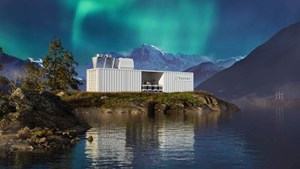News
ABB advanced power technology to play key role in green H2 pilot project
ABB is supplying critical power technology to the HyPilot project, the in-field demonstration of Norwegian company Hystar’s one-megawatt (MW) containerized proton exchange membrane (PEM) electrolyzers, to qualify Hystar’s technology under realistic field conditions. The project will be delivered in Q4 of 2023 at the Gassco-operated Kårstø Gas Processing Plant in Rogaland, Norway. ABB joins Nordic industry leaders Equinor, Yara and Gassco in participating in the highly anticipated field project.
ABB’s low-harmonic insulated-gate bipolar transistor (IGBT) rectifiers and DC-DC converters will regulate the supply of electricity to the electrolyzer. ABB will also provide local support and expertise on the ground in Norway throughout the project’s duration.
Operators will gather data during the 10,000-hour trial to demonstrate that green H2 can be produced cost-effectively and reliably by utilizing renewable energy sources, such as wind power which is dependent upon overcoming the intermittent nature of renewable energy. The results from the HyPilot project will demonstrate how Hystar’s electrolyzers can be utilized to reduce the production cost of green H2 on an industrial scale, providing performance data from various operating regimes to verify long-term commercial operation.
Chris Poynter, Division President, ABB System Drives said, “The electrolyzer power system minimizes the network’s harmonic content and footprint while maximizing efficiency and power factor. This helps drive down the levelized cost of green H2 production, which is a key factor to accelerate its adoption. At ABB we stand for productivity in a low-carbon world so we are proud to work closely with Hystar and other stakeholders to help build the new H2 ecosystem with our domain expertise and technology.”
Fredrik Mowill, CEO of Hystar said, “HyPilot represents an important milestone for the green H2 industry, as it unites leading industry players behind Hystar’s patented, ultra-efficient electrolysers. ABB’s important contribution will enable us to rigorously test under a range of conditions, facilitating the widespread adoption of large-scale green H2 production.”


